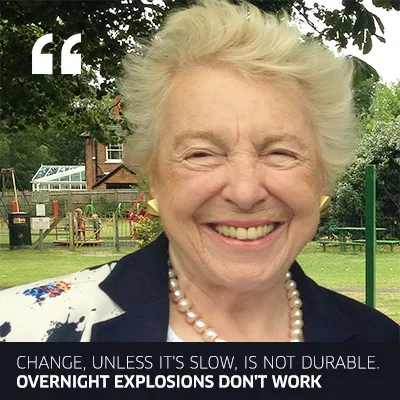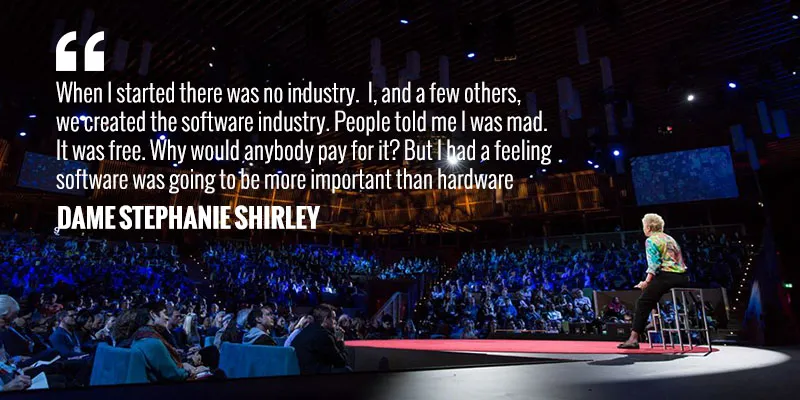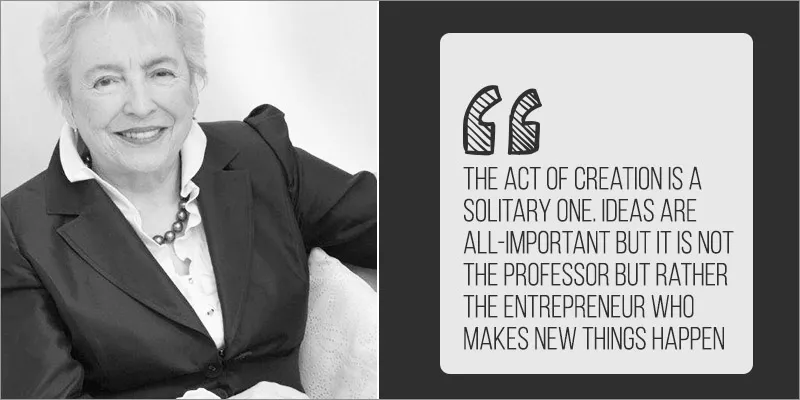One challenge has never been enough for me: Software pioneer Dame Stephanie Shirley
Having escaped Nazi Germany at the age of five, survival is a concept Dame Stephanie Shirley never took for granted. She founded a software startup in 1962, when software came free with the computer’s hardware, and turned it into a $3 billion company. She also invented the concept of freelancing, employing young mothers and letting them work from home, unheard of at that time.
“People told me I was mad. That it was free, why should anybody pay for it. But I had a feeling that software was more important than hardware,” she says.
Her goals were few and simple – to create an industry for software where none existed, to not have to answer to a male boss who would always consider her to be a subpar employee and to empower women to be in charge of their own lives through financial independence.
Her TED Talks bio describes her as “the most successful tech entrepreneur you have never heard of”. But once she took to the stage for her TED Talk that was no longer the case. In it, she spoke about the odds she faced by being in an industry that was dominated by men and of the processes and practices she developed that are now industry standards. There was also some humour: “You can always tell ambitious women by the shape of our heads: They’re flat on top for being patted patronizingly.”
The talk has been viewed more than 1.5 million times, and her memoir, Let It Go, detailing the transformation of a child refugee into the foremost entrepreneurs of our age, is a bestseller.
Dame Stephanie’s company, Freelance Programmers, pioneered the concept of freelance work. A gifted mathematician, she is one among the handful of visionaries who created the modern software industry as we know it. When her company was eventually floated on the stock market, 70 of her employees became millionaires. After officially retiring in 1993, she has donated most of her wealth to charity and has become a devoted philanthropist.
Dame Shirley spoke to YourStory about starting up in the 1960s, employing Indian women in senior positions even back then, posing as a man to secure contracts and what sets entrepreneurs apart from the rest of the human race.
What drives you?

Most of us are in technology because we find it interesting. I could hardly believe I was being paid so well to write software because it was such fun. I was driven by a spiritual belief in my work, but my company was driven by this crusade for women. We wanted women to take full control of their economic lives. That made a lot of difference to how the company started. No, I didn’t think I was going to change the world, but I did think I was going to change things for women.
In your book you write that change can be catastrophic, but isn’t necessarily so. The kind of work that you and women of your generation did helped break the glass ceiling. But I feel that we are going around in circles, fighting the same battles that women shouldn’t have to deal with in the 21st century anymore. Is change really even seeping in? Does it not frustrate you how slow it is?
Yes it’s slow. But unless it’s slow it’s not durable. Overnight explosions do not work. The women’s movement has been transforming lives for the past hundred years. The laws it helped enact prevents society from moving backwards.
Some of the issues under discussion in the UK are exactly the same as I was discussing those 50 years ago. The laws have changed but the issues have not. Equal opportunities, equal pay, these issues of the past are as relevant as ever.

When I first got started in business I was young and idealistic and we women fought hard to be viewed as professionals instead of sex objects. Professional people would be pinching my bottom, which made things difficult when we were trying to sell serious software. Now the issues are much more hidden and insidious. There are cultural issues. Conversely it’s become easy for women to blame sexism for their lack of success. We have to learn how to contribute to as well as enjoy the successes of the 21st century.
You said you shared a special connection with India…
Yes, I do. My husband was brought up in India, but those were the days of the Raj, so you probably don’t want to talk about that.
I was employing Indian women as senior software professionals back in the 1960s. I still remember the first Indian woman I employed, Mrs Bakaya, and I was fascinated with her lovely saris and the little dots (bindis) she wore on her forehead. She was a very educated and cultured lady, and we would have conversations about art and literature and other topics far beyond software. We never became friends because I was the boss. But it was a joy to work with her.
Your strong ideological stance when founding your company renders you as much an activist as it does an entrepreneur.
My company was one of the first social businesses around. We didn’t call it that back then. We didn’t have a word for it. I investigated whether or not to start it as a charity and run it as a 100% social enterprise. But then I realised that as women, we would never be taken seriously unless we were making serious profits. Progress was slow – it was 25 years before we paid a dividend, several years before I drew a salary and in the first year I didn’t even draw expenses. I am very proud, not of the money per se, but the wealth we created, the employment we provided and the changes we helped institute.
Escaping Nazi Germany and becoming a refugee in England—how much did your past power your future?
The whole of my life is driven and motivated by my past. I still have this feeling that I shouldn’t waste a day,that I have to prove that my life was worth saving. That is as strong today as it was 75 years ago. I am very old now but every day I wake up feeling how lucky I was. Everybody helped me at the time and now I need to help other people.
Starting up for you stemmed not so much from a desire to become an entrepreneur. It was the only viable alternative so you could continue doing the work you wanted to do?
I started working at the age of 18 in a research station which was predominantly male. When I first walked into the canteen, there were some 200 people sizing up the new female personnel. While I was a junior, everyone was very nice to me. I was a pretty young woman and everyone was very kind. But as I studied more, became ambitious and it became clear that I was intending to go places, the attitudes changed. I started hearing things like, “It’s not for you. You’re a woman,” and, “I would never appoint a woman to a graduate position,” and “I don’t believe in women doing these sorts of jobs.” There was some legislation at that time for working women, especially those working difficult jobs like in coal mines, etc. The legislation was aimed at protecting them from working late nights and so on. I was working late nights on the computer and laws like this would be used to undermine me. The attitudes I was fighting were overbearingly paternalistic, like, “Oh we mustn’t let the dear little thing do this.”
At the time, I was working on a project called the Transatlantic Telephone Cable. The cables were being laid across the Atlantic by a ship, the Monarch, which rolled them out. I wasn’t allowed to get on the ship, even though my job profile sort of demanded it, because there were no toilets for women on ships. The captain of the ship didn’t like women on board. These little suppressions, they were endless. It was time for me to move on and do my own thing.
What was it like starting up in the UK in the 1960s?
You will laugh because I had absolutely no capital whatsoever. I had £6, which is worth about £100 in today’s world. I financed the business with my own labour, and later on by borrowing against the family house. I didn’t know anything at all about business. Nothing.
For my first project, I got the pricing all wrong. I only thought about the money in terms of the work, not allowing anything for the overhead. I was so absorbed in the employment side of things that all my values were about people and production rather than of effective economic running of the business. So I staggered through from year to year. It was a very slow start.

I was an amateur but I had the sense to know that I was an amateur. So I contacted a local management centre and said to them, “Come and have a look at my company, which is a modern company. Computers. Big stuff. So you will learn about how a modern company is behaving and the struggles we have. And you will help me learn how to market and sell.”
Nowadays of course the world is so different. You have all these youngsters setting up high-tech companies and shooting up into billionaires in 10 years or something like that. Like Facebook and others. Facebook now employs 3,500 women. But it did not have a single woman on its board when it went public. So things change but they also remain the same.
What was the software industry like in the 1960s? What did you want to do differently through your company in handling the issues of the day?
When I started, there wasn’t an industry. I, and a few others, we created the industry. Software was given away free with the hardware at the time. The business model that I had was to take software out of that bundle and sell it. People told me I was mad. That it was free, why should anybody pay for it. But I had a feeling that software was more important than hardware.
I mostly approached American companies because culturally they were more open to new ideas than the British, who were more traditional. I wrote lots and lots of letters to people who were advertising for computer staff. I wrote to them saying that I wasn’t looking for a job but to tell them about my company’s services. Those letters got very little response. My husband then suggested that I stop using my name, Stephanie Shirley, and start using my family’s nickname for me, Steve. Steve was more successful than Stephanie and was able to talk to the managers about the services that we could provide. Of course once they realised I was a woman they hadn’t the nerve to tell me to go away. That’s how it all started.

It was a lot of fun, actually. We knew we were doing something different. We didn’t know how important it was at that time. We struggled to survive from year to year. The more difficult it became the more determined I became. Then gradually the market took over and we eventually became a successful company. Then we began to look like any other company.
But we were working from my home. We had a small home then and I had a young baby. I would work on the dining room table with the baby in a carry cot at my feet. Somebody would be working in the drawing room with papers all over the piano (my husband is a pianist). Somebody would be working up in the bedroom. For a modern company it was not a very modern home. We still had coal fire. As manager, I had to guide the staff. But I also had to keep the fires burning. So I was also carrying around the logs and the coal in order to keep the place heated.
Sounds fascinating…
It was exhilarating. It was a happy time in my life, with the company and a young family. The world is such a different place now. The struggles we faced were so basic compared to what I have to deal with now, in terms of corporate governance and taxes! (grimaces).
What were some of the first few projects your company undertook?
The first one came – surprise, surprise – from my ex-employer. It was a computer manufacturer that I had previously worked with. I think they were a bit mean because I didn’t know anything about pricing and they offered me, basically, what I had been earning as a salary from them previously.
The second one was through a former colleague who was working with an American consultancy, which was setting up a subsidiary in the UK, and they asked me to design the management protocol.
So the first few projects all came through friends of friends of friends. A very important one was for the British Railways scheduling freight trucks and I was very lucky to be able to land that one. Because I was contracted to do that work, I needed to travel around the UK. For the first time in my life I was travelling first class!
The one word that comes to mind is audacious. You took on so many different challenges: to employ a firm of only women, to empower those women to work freelance at a time when it was unheard of, to sell software when it was being given away for free. Usually when conquering boundaries, it would seem more practical to conquer one category at a time. You dived in head first.
I think that the pursuit of several missions at the same time is something to do with entrepreneurs. Any one of the aims you mentioned should have been enough to keep me busy. But one challenge has never been enough for me.
What is your advice to aspiring entrepreneurs?
The act of creation is a solitary one. I believe that you have to put yourself in the user’s shoes and see what they are seeing. Ideas are all-important. However, it is not the professor, but rather the entrepreneur, who makes new things happen.

Women, in particular, can bring in different perspectives. My advice to female entrepreneurs is not to emulate traditional male work patterns, rather to develop their innate qualities. These are typically strength in communication, team work and – dare I say it – perfectionism. Find something that you care about, get trained, surround yourself with first class people, and then enjoy yourself.







